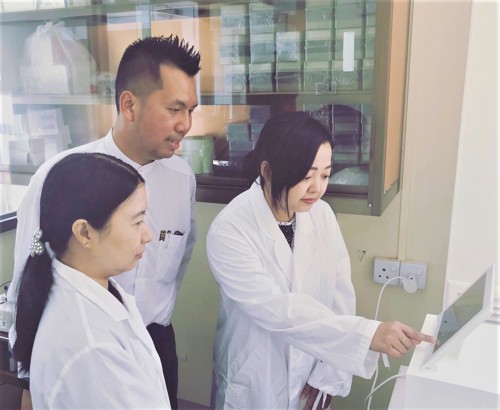MWC researchers ramp up international infectious disease work
The MWC has long recognised the value in investing in research to fight infectious diseases such as tuberculosis (TB), which remains difficult to treat or prevent. MWC teams are contributing to a number of international research collaborations targeting this disease.

MWC investigator Dr Htin Lin Aung (Centre) with Dr Wint Wint Nyunt (left) and Dr Myat Su frin the Myanmar National Tuberculosis Reference Laboratory, using the laboratories new next-generation sequencing machine.
Infectious diseases present a major health threat worldwide and, despite the advantages our geographical remoteness affords, New Zealand is not immune, as demonstrated by the ongoing global coronavirus (COVID-19) pandemic.
TB remains a grave problem for large swathes of the world’s population, including New Zealanders and our neighbours in the Pacific Islands, especially as new drug-resistant strains of Mycobacterium tuberculosis - the bacteria that causes TB - emerge and spread. Approximately 80% of all TB cases in New Zealand are from cases born outside the country, according to MWC Associate Investigator Dr Htin Lin Aung, from the University of Otago.
“That is why much of our research and outreach activities are focused on populations abroad – the ultimate aim of these efforts is to mitigate the threat of TB to New Zealand.”
“Our TB research programme in Myanmar has started with a 2014 pilot study supported through the Maurice Wilkins Centre Flexible Research Programme,” said Htin. “It has now become a major TB research site for us.”
Their work in the country has continued to progress to ever more advanced levels to the extent that it has also now attracted funding from the World Health Organisation (WHO), the New Zealand Government and New Zealand expatriates living in Myanmar.
At the end of last year, Htin visited Myanmar to attend a special donation ceremony to unveil state-of-the-art genome sequencing equipment for their project in collaboration with the Myanmar National TB Programme (NTP). This is now one of the few NTPs in high-TB burden, low-resource countries with this advanced capacity.
“This equipment will further support our ongoing collaborative effort to effectively diagnose drug-resistant TB (DR-TB), enable progress in understanding the DR-TB epidemiology and facilitate improved and new DR-TB treatment,” said Htin.
The medicinal chemistry expertise within the MWC is internationally recognised with our investigators having significant involvement in international efforts to develop better TB drugs. Investigators at the Auckland Cancer Society Research Centre, led by Professor Bill Denny and Associate Professor Brian Palmer, have continued their ongoing collaboration with the TB Alliance with the development of four new drugs taken to or selected for clinical trials. Professor Dame Margaret Brimble has initiated new work with the TB Alliance that will see the development of an asymmetric synthesis of a new drug targeting the high priority target ATP synthase. This work will reduce the costs of goods of the drug to enable its distribution to poor countries.
In 2019, MWC TB researchers were involved in a number of break through studies on the metabolism and persistence of Mycobacterium tuberculosis in host tissues. Two of these studies published in Nature Communications provide new and fundamental information on the pathways essential for persistence of Mycobacterium tuberculosis, which will provide the molecular framework for the development of new therapeutics targeting these essential processes1,2.
References:
1. Bashiri G, Antoney J, Jirgis ENM, et al. A revised biosynthetic pathway for the cofactor F420 in prokaryotes. Nat Commun. 2019;10(1):1558. Published 2019 Apr 5. https://doi:10.1038/s41467-019-09534
2. Hasenoehrl, E.J., Sajorda, D.R., Berney-Meyer, L., Tufariello, J., Cook, G.M., Jacobs Jr, W.R. and M. Berney. Derailing the aspartate pathway of Mycobacterium tuberculosis to eradicate persistent infection. Nature Communications 2019 Sep 16;10(1):4215. https://doi: 10.1038/s41467-019-12224-3
Tuberculosis microscopy image by National Institute of Allergy and Infectious Diseases (NIAID)